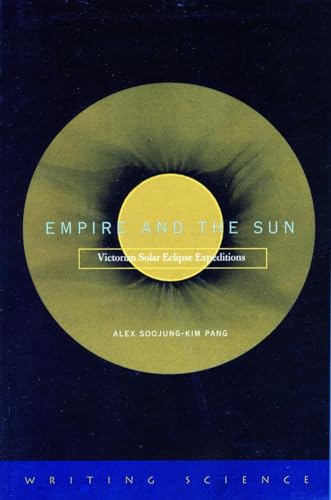Verwandte Artikel zu Empire and the Sun: Victorian Solar Eclipse Expeditions...

Zu dieser ISBN ist aktuell kein Angebot verfügbar.
Alle Exemplare der Ausgabe mit dieser ISBN anzeigen:„Über diesen Titel“ kann sich auf eine andere Ausgabe dieses Titels beziehen.
- VerlagStanford University Press
- Erscheinungsdatum2002
- ISBN 10 0804739250
- ISBN 13 9780804739252
- EinbandTapa dura
- Anzahl der Seiten224
- Bewertung
Neu kaufen
Mehr zu diesem Angebot erfahren
Versand:
Gratis
Innerhalb der USA
Beste Suchergebnisse bei AbeBooks
Empire and the Sun: Victorian Solar Eclipse Expeditions (Writing Science) by Pang, Alex Soojung-Kim [Hardcover ]
Buchbeschreibung Hardcover. Zustand: new. Bestandsnummer des Verkäufers 9780804739252
Weitere Informationen zu diesem Verkäufer | Verkäufer kontaktieren
Empire and the Sun: Victorian Solar Eclipse Expeditions (Writing Science)
Buchbeschreibung Zustand: New. Bestandsnummer des Verkäufers ABLIING23Feb2416190202020
Weitere Informationen zu diesem Verkäufer | Verkäufer kontaktieren
Empire and the Sun
Buchbeschreibung Zustand: New. Astronomy was a popular part of Victorian science, and British atronomers travelled to remote areas to watch the sun eclipsed by the moon. This book shows how the organization of science, advances in photography, and new printing technology remade the character of scientific observation. Series: Writing Science. Num Pages: 224 pages, 20 illustrations. BIC Classification: 1DBK; 3JH; HBJD1; HBLL; PDX; PGG; PGS. Category: (P) Professional & Vocational; (UP) Postgraduate, Research & Scholarly; (UU) Undergraduate. Dimension: 5817 x 3887 x 20. . . 2002. Hardback. . . . . Bestandsnummer des Verkäufers V9780804739252
Weitere Informationen zu diesem Verkäufer | Verkäufer kontaktieren
Empire and the Sun : Victorian Solar Eclipse Expeditions
Buchbeschreibung Zustand: New. Bestandsnummer des Verkäufers 759770-n
Weitere Informationen zu diesem Verkäufer | Verkäufer kontaktieren
Empire and the Sun : Victorian Solar Eclipse Expeditions
Buchbeschreibung Zustand: New. Bestandsnummer des Verkäufers 759770-n
Weitere Informationen zu diesem Verkäufer | Verkäufer kontaktieren
Empire and the Sun: Victorian Solar Eclipse Expeditions
Buchbeschreibung Zustand: New. Astronomy was a popular part of Victorian science, and British atronomers travelled to remote areas to watch the sun eclipsed by the moon. This book shows how the organization of science, advances in photography, and new printing technology remade the chara. Bestandsnummer des Verkäufers 595014512
Weitere Informationen zu diesem Verkäufer | Verkäufer kontaktieren
Empire and the Sun
Buchbeschreibung Zustand: New. Astronomy was a popular part of Victorian science, and British atronomers travelled to remote areas to watch the sun eclipsed by the moon. This book shows how the organization of science, advances in photography, and new printing technology remade the character of scientific observation. Series: Writing Science. Num Pages: 224 pages, 20 illustrations. BIC Classification: 1DBK; 3JH; HBJD1; HBLL; PDX; PGG; PGS. Category: (P) Professional & Vocational; (UP) Postgraduate, Research & Scholarly; (UU) Undergraduate. Dimension: 5817 x 3887 x 20. . . 2002. Hardback. . . . . Books ship from the US and Ireland. Bestandsnummer des Verkäufers V9780804739252
Weitere Informationen zu diesem Verkäufer | Verkäufer kontaktieren

